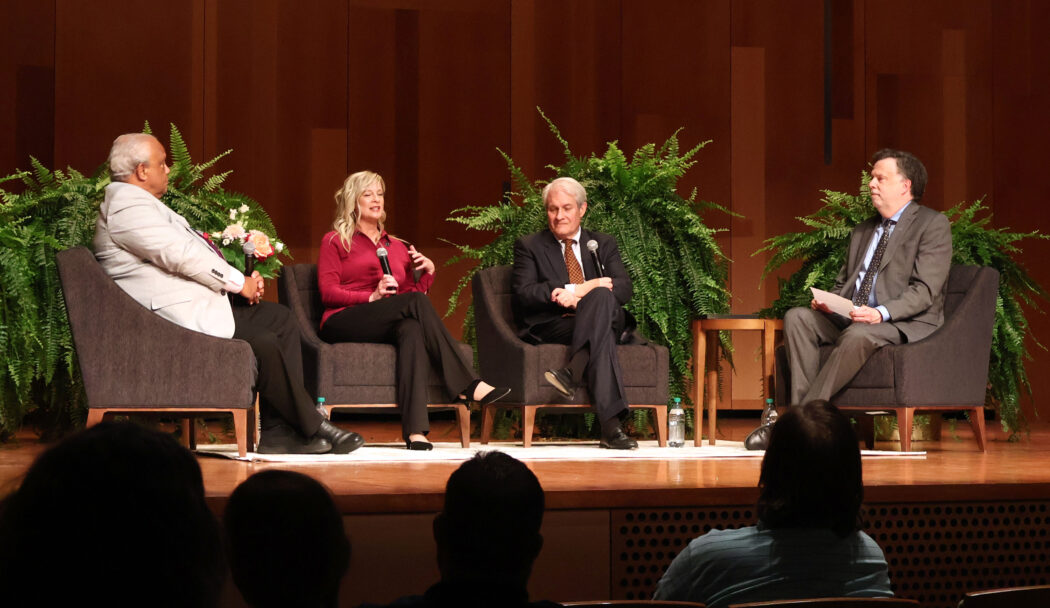Addressing political polarization: President’s forum hosts conflict panel
The second annual President’s Forum on Conflict and Conflict Transformation, titled Navigating Political Polarization: A Call to Constitutional Action, featured Judge Thomas B. Griffith as keynote speaker.
Griffith’s lengthy experience includes serving as a federal judge on the United States Court of Appeals for the D.C. Circuit, chief legal officer of the U.S. Senate and a member of former President Joe Biden’s Presidential Commission on the Supreme Court. He is currently a lecturer on law at Harvard and Stanford law schools.
Griffith spoke about the “profound crisis” of political polarization in the United States. His speech focused on how the U.S. Constitution’s foundational principles of negotiation and compromise can provide pathways to address toxic polarization.
Griffith started his speech with some “bad news:” the United States is politically polarized in ways it has never been before. The difference in polarization today is based on what Griffith defines as affective polarization, where one’s hatred for the other side motivates their engagement.
Griffith clarified the issue is not a disagreement.
“I’m an American. I disagree about everything, okay, and that’s good,” Griffith said.
The issue is contempt, which Griffith says is a “cancer.” Part of the issue comes from a media landscape that thrives on addiction to outrage. He identified problems with cable news, talk radio and social media.
“You’re being played. You know that, right? It’s being carefully curated,” he said.
Griffith offered three solutions to building trust in democracy and healing political polarization.
The first solution, which he deemed easy, is building trust in the election system. Griffith referenced an article he assisted in writing: a case called “Lost, Not Stolen: The Conservative Case that Trump Lost and Biden Won the 2020 Presidential Election.” Griffith told the audience that while not perfect, the U.S. election system is good.
The next solution he claimed is a little bit harder, which is building confidence in the judicial system. Griffith noted he served on the D.C. Circuit for 15 years.
“Never once did I see any one of them cast a vote that was in any way tainted by their partisan priors,” Griffith said.
The hardest one is the most important to Griffith: supporting the basic principles of the Constitution. Though protecting human rights is important, Griffith claimed the most important function of the Constitution precedes even that. He explained it teaches Americans how to create a structure of government that tells them how to work together when they disagree.
Griffith spoke about the events at the Constitutional Convention in Philadelphia. He said compromises must be made in order to build a country like this.
He claimed these changes must happen in the institutions of family, church and school.
“I wish it would come from our leaders, but I don’t think we can wait for that,” Griffith said.
Following Griffith’s speech was a panel featuring Lord Michael Hastings of the Stephen R. Covey Leadership Center Advisory Board and political science professor Jeannie Johnson. USU’s College of Humanities and Social Sciences Dean Joseph P. Ward moderated, asking questions submitted by audience members prior to the event.
When asked about political polarization, Johnson said it is important to understand issues are often not a matter of right versus wrong. When people seek to understand others, they see a wider picture of why others do the things they do.
“See decisions… as packages of trade-offs instead of along a moral scale,” Johnson said.
Hastings noted the world “needs people of huge intelligence and integrity, but we need them to be prepared to stand up and stand out.”
Griffith ended his thoughts by commenting on the need for these changes on college campuses.
“I think colleges and universities are the most important component,” Griffith said.
Johnson agreed and discussed her hope in Generation Z.
“They already do this really well… In some ways, the adults need to get out of the way,” she said.
Johnson said she believes Gen Z can help bridge the divide, but only if they make the effort to do so.
“They’re there. They’re interested in behaving this way… we just need to give them the room to express it,” Johnson said.
You must be logged in to post a comment.


There are no comments
Add yours